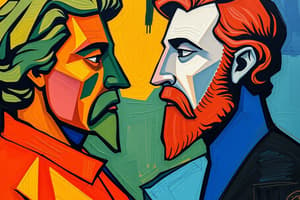Podcast
Questions and Answers
What concept primarily emphasizes the idea that individuals should be free to pursue their own paths without government interference?
What concept primarily emphasizes the idea that individuals should be free to pursue their own paths without government interference?
- Utilitarianism
- Self-Help
- Negative Liberty (correct)
- Laissez Faire Capitalism
Which of the following best describes the viewpoint of Classical Liberalism regarding the role of government?
Which of the following best describes the viewpoint of Classical Liberalism regarding the role of government?
- Government should enforce equality of outcomes.
- Government should have minimal intrusion into individual liberties. (correct)
- Government should actively intervene in economic affairs.
- Government should regulate markets to prevent failure.
What was Mary Wollstonecraft's significant concern regarding liberty?
What was Mary Wollstonecraft's significant concern regarding liberty?
- That individualism would lead to social discontent.
- That true freedom cannot exist if women are oppressed. (correct)
- That capitalism would undermine personal rights.
- That government intervention was necessary for equality.
What economic theory promotes the idea that the market operates best without government intervention?
What economic theory promotes the idea that the market operates best without government intervention?
Which philosopher is associated with the concept of utilitarianism focused on the happiness of the greatest number?
Which philosopher is associated with the concept of utilitarianism focused on the happiness of the greatest number?
What concern did Smiles express regarding the rise of socialism?
What concern did Smiles express regarding the rise of socialism?
How did Herbert Spencer view the potential consequences of increased government power?
How did Herbert Spencer view the potential consequences of increased government power?
Which of the following best captures the legacy of the Industrial Revolution in Classical Liberal thought?
Which of the following best captures the legacy of the Industrial Revolution in Classical Liberal thought?
What does Positive Liberty suggest about negative liberty?
What does Positive Liberty suggest about negative liberty?
John Rawls' 'veil of ignorance' thought experiment is meant to address what issue?
John Rawls' 'veil of ignorance' thought experiment is meant to address what issue?
What main argument did John Maynard Keynes propose regarding the state?
What main argument did John Maynard Keynes propose regarding the state?
How did Modern Liberals view the role of the state in relation to individual liberty?
How did Modern Liberals view the role of the state in relation to individual liberty?
What aspect of individual rights is crucial to the Modern Liberal perspective?
What aspect of individual rights is crucial to the Modern Liberal perspective?
Flashcards
Social Darwinism in Society
Social Darwinism in Society
Applying Darwin's "survival of the fittest" to society, suggesting a minimal state and laissez-faire capitalism are natural and beneficial.
Modern Liberalism
Modern Liberalism
A political ideology emphasizing individual liberty, social justice, and an enlarged role for the state to support individual potential.
Positive Liberty
Positive Liberty
The idea that freedom requires enabling factors, such as resources and opportunities for individuals to achieve their potential rather than just the absence of constraints.
Rawls' "Veil of Ignorance"
Rawls' "Veil of Ignorance"
Signup and view all the flashcards
Keynesian Economics
Keynesian Economics
Signup and view all the flashcards
Classical Liberalism
Classical Liberalism
Signup and view all the flashcards
Negative Liberty
Negative Liberty
Signup and view all the flashcards
Minimal State
Minimal State
Signup and view all the flashcards
Laissez-faire capitalism
Laissez-faire capitalism
Signup and view all the flashcards
Utilitarianism
Utilitarianism
Signup and view all the flashcards
Natural Rights Theory
Natural Rights Theory
Signup and view all the flashcards
Industrial Revolution
Industrial Revolution
Signup and view all the flashcards
Individualism
Individualism
Signup and view all the flashcards
Study Notes
Core Features of Liberalism
- Individual freedom
- Private property
- Liberty
- Capitalism
Classical Liberalism
- 17th Century to Late 19th Century: Negative liberty emphasized individual freedom from interference. This was viewed as a natural right for self-determination and self-reliance.
- Minimal State: Government intervention should be limited, with liberty understood as the absence of constraint. Jefferson advocated for "the government that governs least..."
- Laissez-Faire Capitalism: Free markets, not government intervention, were believed to drive wealth creation, with benefits trickling down to all.
- Mary Wollstonecraft: Questioned how a nation could be free if women weren't.
Later Classical Liberalism
- Industrial Revolution's Role: Classical liberals analyzed the industrial revolution's impact on economies and societies, focusing on individual choices and maximizing happiness (Utilitarianism).
- Utilitarianism: Bentham's theory proposed a scientific alternative to Natural Rights Theory, emphasizing the "greatest happiness for the greatest number".
- Self-Help: Thinkers like Smiles emphasized self-reliance, arguing that state intervention would stifle individual development. Individuals should strive for their own success, rather than relying on the state for support. Herbert Spencer, a contemporary, shared this view.
- Smiles and Spencer: Both emphasized the importance of self-help and disliked excessive state intervention in society.
Modern Liberalism
- 19th Century to Present: Modern liberals questioned if individuals could truly achieve liberty in the face of strong economic forces, like capitalism.
- Positive Liberty: Recognized that negative liberty (freedom from interference) wasn't enough for individuals to achieve their full potential; enabling conditions were needed.
- Social Justice and the Enlarged State: Modern liberals advocated for a more involved state to address social inequalities and ensure basic opportunities, such as pensions and welfare.
- John Rawls and the "Veil of Ignorance": This experiment addressed the issue of social inequality, questioning whether individuals would accept a birth lottery, suggesting that awareness of potential inequality and need for state intervention is valid.
- John Maynard Keynes: Advocated for state intervention to manage the economy and ensure full employment, recognizing a necessary role for the state to help achieve freedom and liberty for all.
- Tolerance of Individual Freedoms: Emphasized the importance of individual rights, especially concerning personal freedom of choice, without state interference or restrictions.
Studying That Suits You
Use AI to generate personalized quizzes and flashcards to suit your learning preferences.




